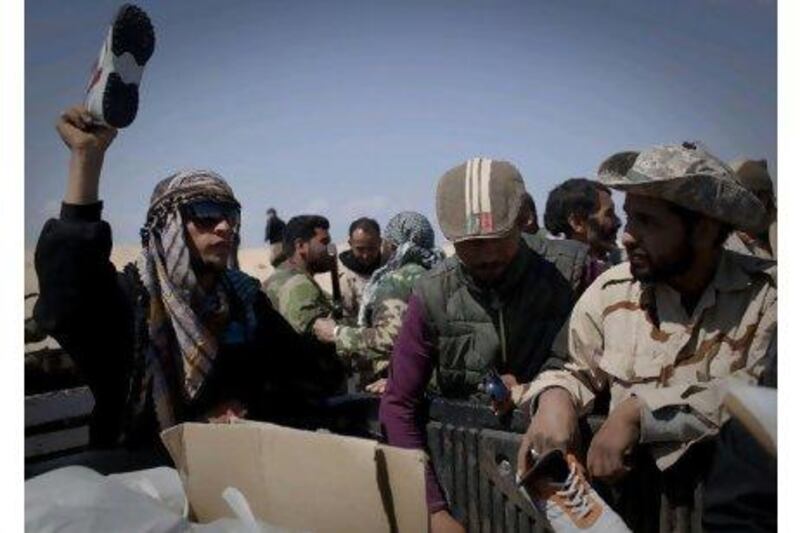French fighters shot down a Libyan jet yesterday to end the first reported breach of the no-fly zone since the start of the coalition's military intervention against Colonel Muammar Qaddafi's regime six days ago.
The warplane was attacked near the rebel-held port of Misurata, where there were fears of a growing humanitarian crisis as thousands sought to flee attacking government forces.
It was not immediately clear when the Libyan aircraft was destroyed, but a number of reports suggested a fierce battle was being waged for control of the city, 210 kilometres east of Tripoli.
A doctor working in Misurata's state hospital said at least 109 people had been killed in the rebel-held city and more than 1,300 were wounded in a week of attacks by Col Qaddafi's forces.
Witnesses said dozens of people had been killed or severely wounded by tank fire and rooftop snipers, with parts of the city at the mercy of government troops.
Coalition forces have had some success in the outlying districts of Misurata, while struggling to counter the threat from government tanks.
More than 6,000 workers from Egypt and other African nations were said to be stranded at the city's port, awaiting boats to ferry them to safer areas.
Similar restraints on transportation and services have affected the alliance's attempts to protect civilians in Ajdabiya, south of the capital. Pockets of government forces are reported to be launching sporadic raids into the city.
In Misurata, tanks had initially rolled back from the city but were said by residents to have returned after nightfall on Wednesday. One doctor told The Washington Post they had been "shelling everywhere".
The doctor, speaking anonymously for fear of reprisals, said conditions at the city's main hospital were deteriorating. Electricity and water had been cut off, patients were being treated on the floor and medical supplies were in short supply.
Mark Ward, an official from the US Agency for International Development, was quoted as expressing concerns about a wider humanitarian crisis in the city.
Separate reports said snipers were firing on people indiscriminately and the hospital itself had been targeted by government forces. A rebel spokesman, Saddoun Elmisurati, told Sky News television that shelling had killed two people.
The hazardous task of avoiding civilian casualties while maintaining robust pressure on pro-Qaddafi land forces was emphasised by Rear Admiral Gerard Hueber, of the US navy, who is chief of staff for the coalition.
He urged the regime to withdraw its forces from populated areas to allow water, food and other supplies to reach the besieged people of Misurata, which has been out of reach for international aid organisations.
Regime officials denied again that civilians had been attacked, claiming that its operations were confined to dealing with "armed gangs".
But in London, William Hague, the British foreign secretary, said "appalling violence" continued to be inflicted on Libyan citizens, "exposing the regime's claims to have ordered a ceasefire to be an utter sham". He told the British parliament that coalition action had nevertheless protected hundreds of thousands of people in Benghazi and Misurata from the "fate that otherwise awaited them".
Libyan officials in Tripoli alleged that strikes carried out by coalition air and naval forces had claimed many civilian lives.
Correspondents working in the capital under severe restrictions imposed by the regime said a Reuters photographer was taken to a morgue at Tajoura, on the eastern outskirts of Tripoli, and shown 18 charred bodies. The dead were described as a mixture of civilians and military personnel, though there was no independent verification of their identities or how and where they died.
Mr Hague insisted that the coalition had taken great care to avoid harming non-combatants and said the only source of indiscriminate or deliberate attacks on Libyan people was Col Qaddafi's regime.
With the future direction of command and control for the international effort to enforce the UN resolution still uncertain, much attention is focused on a meeting in London on Tuesday.
European, American and Arab members of the coalition are expected to be joined by African Union representatives with the aim of forming a "contact group" whose role has yet to be fully defined.
The French want the new body to take over leadership of the operation to enforce the no-fly zone and stop attacks on opponents of Col Qaddafi, with Nato providing a command structure but in a purely technical sense.
The US and Britain still strongly favour Nato taking charge of the military imposition of the UN's will.
Gen Carter Ham, who as commander of US Africa Command is currently in charge of the military campaign, told reporters at the Italian airbase at Sigonella, Sicily, that as a military commander his preference was to hand over to Nato.
This would be the best and easiest option because so many of the nations participating in the coalition also belonged to Nato, which had the capacity to "come together very quickly and operate very effectively".
Mr Hague said it was critical that the international community continued to take united and co-ordinated action as the crisis unfolded.
* With additional reporting from Reuters and Agence France-Presse






